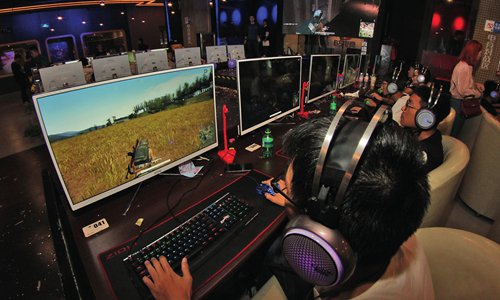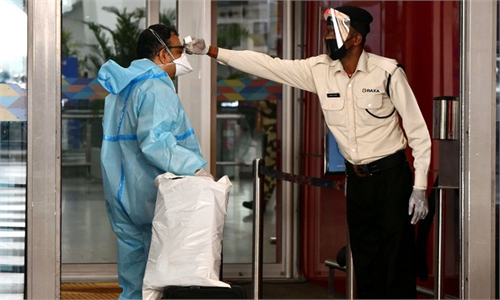SOURCE / INDUSTRIES
Game over for Indian players as government bans Chinese apps: analysts
Game over for Indian players as govt bans apps

Popular game PlayerUnknown's Battleground has drawn millions of Chinese players to the international playground on Steam. Young Chinese play PUBG at an internet cafe in China. Photo: IC
India's mobile gaming companies may lack the ability to fill the void in the domestic market after the Indian government widened its ban on Chinese apps, including the phenomenon PUBG developed by Chinese internet giant Tencent, analysts said.
Since the Indian government banned 118 Chinese mobile apps amid heightened border tensions last week, Indian players have shown their disappointment, with many asking when the ban will be removed and others lamenting the sudden vanishing of the apps.
Compared with previous bans, many of the newly banned apps involve mobile games. Some reports have put the number of banned mobile game apps at 36, or almost 30 percent of the total.
Upset by the ban over PUBG, a 21-year-old Indian college student committed suicide last week, according to Indian media reports.
PUBG MOBILE is arguably the most popular mobile game in India. India accounted for 24 percent of the game's global downloads with 175 million installs, data from Sensor Tower showed. The active daily user base has exceeded 13 million.
Since the sudden ban of the Chinese apps, local companies have been racing to come up with alternatives.
Days after the Indian government banned PUBG Mobile and PUBG Mobile Lite, FAU-G, a made-in-India PUBG mobile alternative, made its debut.
However, Chinese industry observers said that efforts like this may fall short and leave Indian consumers displeased.
Zhang Yi, chief analyst at consultancy iiMedia Research, said that it would take quite some time before Indian players could get worthy made-in-India games, as the country lacks the ecosystem, talent and capital for a mobile game industry to take off.
"In terms of research and development, marketing, operations and art, Indian firms are not on a competitive basis with Chinese firms," Zhang told the Global Times.
Liu Dingding, a Beijing-based internet analyst, said that Indian companies can't create trail-blazing mobile games on their own and are more inclined to tap US alternatives.
"But even this cannot be done in a short time and the Chinese offerings are more suited to the unique needs of Indian players," Liu said.
Denying Chinese entrants will also mean Indian companies losing advanced technologies and concepts from influential Chinese internet companies, and most importantly, the competition they brought to the market, taking Indian online products backward, Chinese analysts said.



